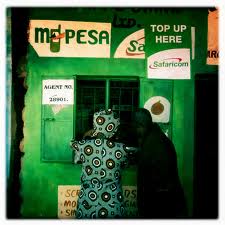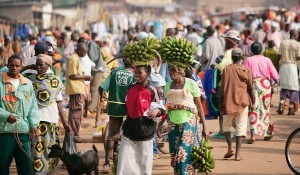 The popular mobile money transfer service, M-Pesa, appears to improve the everyday lives of rural women in Kenya. But a review of some of the current research indicates a need for further conceptualisation of what women’s empowerment means. M-Pesa (“M” for mobile, pesa is Swahili for money) in Kenya is one of the most celebrated success stories of information and communication technologies (ICTs) allowing poor communities to access a revolutionary bank service.
The popular mobile money transfer service, M-Pesa, appears to improve the everyday lives of rural women in Kenya. But a review of some of the current research indicates a need for further conceptualisation of what women’s empowerment means. M-Pesa (“M” for mobile, pesa is Swahili for money) in Kenya is one of the most celebrated success stories of information and communication technologies (ICTs) allowing poor communities to access a revolutionary bank service.
M-Pesa entails the use of a mobile phone to make immediate money transfers from town to village and vice versa, saving time and money, facilitating rapid solutions to the daily problems affecting vulnerable communities, and opening up new ways to manage the cash flow of people whose lives can be improved with very small amounts. At the national level, this technology revolution touches the lives of nearly 70% of Kenyan adults who transfer money to each other via their mobile phones. Kenya ranks number one worldwide in this domain: more than US$320 million is transferred via Kenyan mobile phones each month, which represents roughly a quarter of the country’s gross national product (GNP). Increasingly cash payments are avoided and posters in shops indicate preference for payments via mobile banking.
Numerous videos posted on YouTube show rural women happily using M-Pesa, an illustration of how the service crosses all categories of the population and particularly includes women who are often left out of positive technological improvements in Africa. The phenomenon has caught the attention of researchers with an interest in the position of women in the rural economy in sub-Saharan Africa. Danielle White’s (2012) paper, “The Social and Economic Impact of M-Pesa on the Lives of Women in the Fishing Industry on Lake Victoria,” presents an interesting case.
White’s study concerns communities in Migori County, located on the Kenyan side of Lake Victoria, a population of over one million that relies mostly on fishing for its source of income. In these communities, the social roles in the artisanal fishing value chain are as follows: fishing is considered a job solely for men. Women may own their own boats but never partake in fishing. Mostly women are engaged in the processing and trading of fish but men are also allowed to partake in this business.
For White, the adoption of M-Pesa has brought significant positive changes for the women in these communities.
Firstly, many women now have the ability to save their money in a safe place and build up resources for costly activities and purchases such as helping their families and, most importantly, sending their children to school. Women stated that they were much less likely to spend their money when they saved it in M-Pesa rather than in their homes. Also, in the past, men often used their wives’ money to buy alcohol or other personal items, leaving the women with insufficient funds to process fish. With the women’s money saved in M-Pesa, their husbands no longer have easy access to it.
The women’s transportation expenses have drastically gone down too. This includes the direct costs of transport and the money the women save since they would otherwise have to stop working for a period of time to physically transport their money themselves. Women use their extra money and time to expand their businesses and profits, most often by processing more fish to sell or, for the most audacious, constructing their own fishing boats.
White emphasises the case of a college-educated women, very involved in her community. Using M-Pesa allowed this woman to have more free time to attend different meetings and trainings, from which she gained knowledge on issues like maternal health and business strategies to share with her community. 81% of White’s interviewees said that the use of M-Pesa makes women more independent; they no longer have to rely on others for money.
M-Pesa has also changed relations between men and women by enabling more trust between fishermen and fish processors. As women are saving using M-Pesa, they are able to pay for the quantity of fish that they buy rather than asking for credit. Other gains of confidence among the women of this fishing community are illustrated by the fact that, having discovered the multiple benefits of M-Pesa, many are now considering accessing more financial services including bank accounts. They now see the benefit of combining a bank account for savings with M-Pesa for managing small amounts and transactions. (Many formal banks offer this option in the very responsive Kenyan banking system). In short, the positive impact of M-Pesa on the women of this Luo fishing community cannot be refuted.
To continue reading this article visit Open Democracy.
Written by: Oumy Khairy Ndiaye
3/31/2014
Photo Credit: Mixit.com




